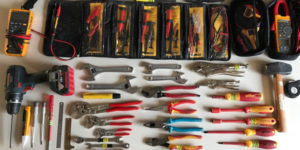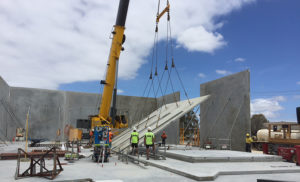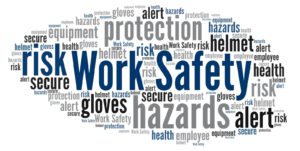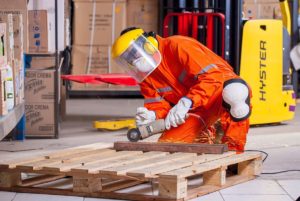Are you getting ready to go on a job? While it’s fun to be outside and building things, accidents are never fun and can really slow down a project. Here are 8 tips to remember that will help you stay safe while building and minimize any potential injuries:
Don’t let your tools end up in someone else’s hands.
When you are done using your tools, don’t leave them laying around. Most of our customers have a locking storage area for their equipment, but if this isn’t possible, you want to make sure that the tool is secured safely. You can use a lock or something like a chain and padlock to do so.
Remember to always lock up your vehicle when you leave it unattended, even if it’s just for a moment. When choosing a lock for your vehicle, choose one that is sturdy and durable! Most high-quality locks will keep unwanted eyes away from your belongings while still allowing quick access when needed.
Make sure you have the right insurance that’s specific to the job you’re doing.
- Make sure you have the right insurance that’s specific to the job you’re doing.
- Public liability insurance is a must for all tradies, and it should be maintained at all times. If an accident or injury occurs on site during work hours and there’s no public liability insurance in place, then the company could be sued and held responsible for any damages or injuries sustained by others.
- Tool insurance is also vital for any tradesperson who owns their own tools—whether they’re contractors or subcontractors—as it protects them from theft and damage claims if something goes missing or breaks down on site during working hours at a client’s property. The same goes for workers compensation insurance if you have employees working under you; without this cover in place, they won’t receive any compensation if they end up injured while on your payroll!
If you’re concerned about having enough coverage to protect yourself from all these different types of risks while carrying out your job duties as a contractor/subcontractor, then please contact us today so we can help answer any questions or concerns that might arise before signing anything else up (or renewing) with one of our experts here at Tradies 365.
Always tell your employer (and others) what you’re working on.
Always tell your employer (and others) what you’re working on.
- Inform your employer of your role and the worksite.
- If you are not certain how to do something correctly, tell them so they can help guide you through it.
- When someone is performing work incorrectly, let your supervisor know so they can correct this behaviour or remove that employee from the job site if necessary.
- If you are injured while on the job site and need medical attention, inform the proper authorities immediately before continuing with work or leaving the area if possible
Watch out for slips, trips, and falls.
- Be aware of your surroundings and don’t rush.
- Watch out for loose wiring.
- Be careful of spillages, especially if it’s oil or chemicals that could be harmful to you or others around you.
- Make sure the equipment you use is safe before using it, including checking that no screws are missing from chairs, tables (or anything else) and making sure all cutting tools are sharpened correctly and won’t jam up when pushed against something hard like wood or metal.
- Make sure any equipment you use is set up properly in case there’s an accident where someone trips over something lying on the floor by mistake – this could lead to serious injury! It’s best not to take risks when working on projects so always keep safety as a priority!
Always wear the right personal protective equipment for the job.
Job site safety is always a concern for workers, but it’s especially important when you’re working with machinery. That’s why it’s important to wear the right personal protective equipment for the job.
Here are some general tips:
- Wear appropriate clothing – You should never go on a construction site or anywhere else where you could be injured without wearing hardhats and high visibility jackets (also known as vests). These provide protection against head injuries and help others see that they’re in an unsafe area; they also make sure that bystanders know what type of work is being done so they can avoid accidentally getting hurt themselves.
- Wear safety boots, glasses/goggles (or masks), ear defenders (or earplugs) and gloves – These items protect against all sorts of hazards like falling objects or chemicals; they may even help prevent heatstroke in hot weather conditions such as desert summers although there are better ways to prevent heatstroke than just wearing protective gear!
Search for risk assessments by company or industry name on HSE’s website.
It’s important to know that you can use the risk assessment as a template for your own. This will save time and make it easier to prepare.
If your employer doesn’t have a risk assessment or if you need a refresher, try searching for them on the HSE website by company or industry name (or job title). Just enter some information into the search box and hit enter; it’s easy!
If you see someone doing something that could cause injury, say something!
If you see someone doing something that could cause injury, say something!
- The best way to speak up is in a setting where everyone else is relaxed and comfortable. Don’t do it while people are stressed out or angry—it’s too hard to listen then!
- It’s also important that the climate of your workplace be one in which employees can freely express themselves without fear of being penalized for speaking out. If there are any kind of repercussions if you speak up, it won’t help anyone.
- And finally, make sure what you’re saying makes sense by considering these questions: Is this really an issue? Does anyone have enough information about what’s going on? How will this affect the safety of our workers?
Know what to do if your employer isn’t compliant with health and safety rules.
If you are concerned about your employer’s compliance with health and safety rules, remember that you have a legal right to ask them to put things right.
If it is a serious issue which could affect the health and safety of others, report it to the relevant authorities. For example, if an employer has failed to provide protective equipment and clothing for workers who are exposed to hazardous substances or processes, then you should report this immediately under section 3 of the Reporting of Injuries, Diseases and Dangerous Occurrences Regulations 2013 (RIDDOR).
If it is something else that isn’t so serious but still needs sorting out—for example, dirty toilets—then talk to your employer about it as soon as possible. Your employer may not realize how important these things are for your comfort at work! If you need more help on this kind of thing, ask your trade union representative for advice on how best deal with any problems like this.
If you’re in a high-risk job and worried about what might happen during work hours (such as an explosion), then speak up! You can join forces with other employees by forming a group called a Safety Rep Team – they’ll support each other through difficult times while helping keep each other safe too!
Workplace injuries are preventable by following correct procedures.
Workplace injuries are preventable by following correct procedures. If you are concerned about your safety, speak to your employer and ask for a risk assessment. If you still have concerns, contact your union rep or the HSE (Health and Safety Executive).
Any questions about this blog? Contact us and one of our team members will be in touch shortly!




